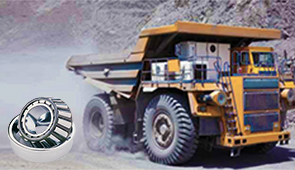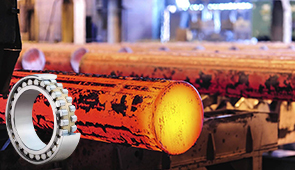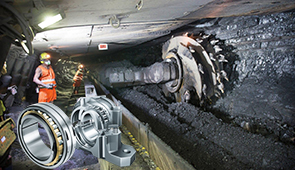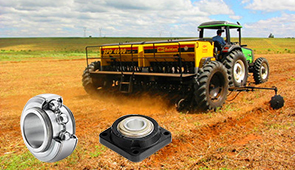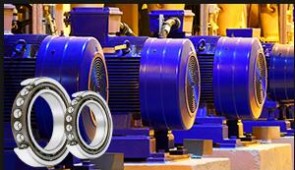Tolerance symbols
Loyal bearings
| Tolerance symbol |
Definition |
| Radial bearings inner ring – cylindrical and tapered bore | |
| d |
|
| Δdmp |
|
| Δds | Deviation of a two-point size of bore diameter of a cylindrical bore from its nominal size |
| Vdsp | Range of two-point sizes of bore diameter in any cross section of a cylindrical or tapered bore |
| Vdmp | Range of mid-range sizes (out of two-point sizes) of bore diameter obtained from any cross section of a cylindrical bore |
| B | Nominal inner ring width |
|
ΔBs Normal, Modified1) |
|
| VBs |
|
| Kia4) | Circular radial run-out of inner ring bore surface of assembled bearing with respect to datum, i.e. axis, established from the outer ring outside surface |
|
Sd4) |
Circular axial run-out of inner ring face with respect to datum, i.e. axis, established from the inner ring bore surface |
| Sia4) | Circular axial run-out of inner ring face of assembled bearing with respect to datum, i.e. axis, established from the outer ring outside surface |
| Radial bearings inner ring – tapered bore only | |
| d1 | Nominal bore diameter at the theoretical large end of a tapered bore |
| Δd1mp | Deviation of a mid-range size (out of two-point sizes) of bore diameter at the theoretical large end from its nominal size |
| SL | Taper slope, the difference between nominal diameters at the theoretical large end and small end of a tapered bore (d1 – d) |
| ΔSL | Deviation of taper slope of a tapered inner ring bore from its nominal size |
| Radial bearings outer ring | |
| D | Nominal outside diameter |
| ΔDmp | Deviation of a mid-range size (out of two-point sizes) of outside diameter in any cross section from its nominal size |
| ΔDs | Deviation of a two-point size of outside diameter from its nominal size |
| VDsp | Range of two-point sizes of outside diameter in any cross section |
| VDmp | Range of mid-range sizes (out of two-point sizes) of outside diameter obtained from any cross section |
| C | Nominal outer ring width |
|
ΔCs Normal, Modified1) |
|
| VCs |
|
| Kea4) | Circular radial run-out of outer ring outside surface of assembled bearing with respect to datum, i.e. axis, established from the inner ring bore surface |
| SD4) | Perpendicularity of outer ring outside surface axis with respect to datum established from the outer ring face |
| Sea4) | Circular axial run-out of outer ring face of assembled bearing with respect to datum, i.e. axis, established from the inner ring bore surface |
| Chamfer limits | |
| rs | Single chamfer dimension |
| rs min | Smallest single chamfer dimension of rs, r1, r2, r3, r4 … |
| r1, r3 | Radial direction chamfer dimensions |
| r2, r4 | Axial direction chamfer dimensions |
| Tapered roller bearings | |
| T | Nominal assembled bearing width |
| ΔTs | Deviation of minimum circumscribed size of assembled bearing width from its nominal size |
| T1 | Nominal effective width of cone (inner ring, with roller and cage assembly) assembled with a master cup (outer ring) |
| T2 | Nominal effective width of cup assembled with a master cone |
| ΔT1s | Deviation of minimum circumscribed size of effective width (cone assembled with a master cup) from its nominal size |
| ΔT2s | Deviation of minimum circumscribed size of effective width (cup assembled with a master cone) from its nominal size |
| Thrust bearings shaft washer | |
| d | Nominal bore diameter of shaft washer, single direction bearing |
| Δds | Deviation of a two-point size of shaft washer bore diameter from its nominal size |
| Δdmp | Deviation of a mid-range size (out of two-point sizes) of shaft washer bore diameter in any cross section from its nominal size |
| Vdsp | Range of two-point sizes of shaft washer bore diameter in any cross section |
| d2 | Nominal bore diameter of central shaft washer, double direction bearing |
| Δd2mp | Deviation of a mid-range size (out of two-point sizes) of central shaft washer bore diameter in any cross section from its nominal size |
| Vd2sp | Range of two-point sizes of central shaft washer bore diameter in any cross section |
| Si |
|
| Thrust bearings housing washer | |
| D | Nominal outside diameter of housing washer |
| ΔDs | Deviation of a two-point size of housing washer outside diameter from its nominal size |
| ΔDmp | Deviation of a mid-range size (out of two-point sizes) of housing washer outside diameter in any cross section from its nominal size |
| VDsp | Range of two-point sizes of housing washer outside diameter in any cross section |
| Se |
|
| Thrust bearings assembled bearing height | |
| T | Nominal assembled bearing height, single direction thrust bearing (except spherical roller thrust bearing → T4) |
| ΔTs | Deviation of minimum circumscribed size of assembled bearing height from its nominal size, single direction thrust bearing (except spherical roller thrust bearing → ΔT4s) |
| T1 |
|
| ΔT1s |
|
| T32) | Nominal assembled bearing height, double direction thrust bearing with seat washers |
| ΔT3s2) | Deviation of minimum circumscribed size of assembled bearing height from its nominal size, double direction thrust bearing with seat washers |
| T43) | Nominal assembled bearing height, spherical roller thrust bearing |
| ΔT4s3) | Deviation of minimum circumscribed size of assembled bearing height from its nominal size, spherical roller thrust bearing |
-
1)
Modified applies to inner rings and outer rings of bearings of matched bearing sets consisting of two or more bearings. Does not apply to universally matchable angular contact ball bearings. -
2)
Not included in ISO 199. -
3)
In ISO 199, the symbol T is used. -
4)
Geometrical tolerances
Support/Inquiries
Related Products
UCTH213-40J-300 with Setscrew(inch)
CNSORDERNO: Normal-duty(2)
TOGN: UCTH213-40J-300
SDI: B-R1/8
SD: 2 1/2
UCTH212-39J-300 with Setscrew(inch)
CNSORDERNO: Normal-duty(2)
TOGN: UCTH212-39J-300
SDI: B-R1/8
SD: 2 7/16
UCTH212-38J-300 with Setscrew(inch)
CNSORDERNO: Normal-duty(2)
TOGN: UCTH212-38J-300
SDI: B-R1/8
SD: 2 3/8
UCTH212-36J-300 with Setscrew(inch)
CNSORDERNO: Normal-duty(2)
TOGN: UCTH212-36J-300
SDI: B-R1/8
SD: 2 1/4
UCTH211-35J-300 with Setscrew(inch)
CNSORDERNO: Normal-duty(2)
TOGN: UCTH211-35J-300
SDI: B-R1/8
SD: 2 3/16
UCTH211-34J-300 with Setscrew(inch)
CNSORDERNO: Normal-duty(2)
TOGN: UCTH211-34J-300
SDI: B-R1/8
SD: 2 1/8









